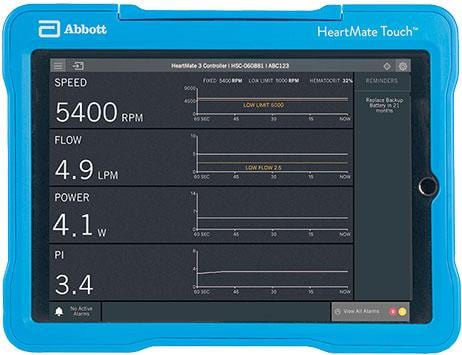
July 2, 2024 — The U.S. Food and Drug Administration (FDA) announced that Abbott has issued a correction for its HeartMate LVAS System Monitor due to screen issues that may cause unintentional pump stop. This recall involves correcting devices and does not involve removing them from where they are used or sold. The FDA has identified this recall as the most serious type. This device may cause serious injury or death if you continue to use it without correction.
Affected Product
Product Names: Thoratec HeartMate System Monitor
Unique Device Identifier (UDI-DI): 00813024010142, 00813024010852
Model Numbers: See full list of affected devices below.
Lot/Serial Numbers: All serial numbers
What to Do
The affected devices are only used by clinicians in a clinical setting such as in an operating room or clinic.
For clinicians
All HeartMate System Monitors may potentially display screen issues.
- Restart the System Monitor unit before connecting to the patient controller if:
- The unit has been running for a long period of time, or
- If screen issues are observed
- To restart, turn off and then turn on using the On/Off Switch located on the back of the System Monitor. Full restart takes approximately 10 seconds.
- LVAD settings will remain the same if the unit is restarted while connected to the patient’s controller.
- Check all cables and connections are secure and undamaged if screen display issues continue after System Monitor restart.
- Use a different System Monitor if screen issues continue.
In case of pump stop:
If the "Stop Pump" button is inadvertently pressed due to these display issues, the pump will stop for a moment and restart unless the pump stop button is pressed longer than ten seconds. In that case, the pump will stop and the controller will alarm "Pump Off Alarm."
- Press any button on the controller to attempt pump restart and resolve "Pump Off Alarm," as directed in the Instructions for Use.
On May 8, 2024, Abbott Medical sent all affected customers an Urgent Medical Device Correction letter that included the clinician actions listed above as well as the following additional details and actions:
- Restarting the System Monitor should resolve the display issues in most cases.
- Distribute the notice to those who need to be aware within the institution and forward to any institution where potentially affected devices have been transferred.
- Complete and return the acknowledgement form attached to the letter by email to [email protected].
Reason for Correction
Abbott Medical is recalling the HeartMate System Monitor, part of HeartMate LVAS, due to atypical behavior of the System Monitor screen (screen issues). The screen issues include screen freezing, overlapping buttons or screens, unresponsive buttons, distorted text or graphics, and wrong or missing information on the display. These issues can cause a clinician user to inadvertently change pump settings or press the pump stop button.
The use of affected product may cause serious adverse health consequences, including decrease in blood pressure and inadequate flow of blood (hemodynamic compromise) caused by a pump stop. This can lead to stroke, irreversible brain damage, heart or organ failure, and death.
There have been 14 reported injuries. There have been no reports of death.
Device Use
The HeartMate System Monitor is one part of a HeartMate Left Ventricular Assist System (LVAS). The System Monitor is used in the operating room or during clinic visits to:
Monitor system operation closely during LVAD implant
- Display information about system performance, including current operating mode, pump flow, pump speed, and overall operational status
- Program system parameters such as pump speed
- Assess and track alarm conditions
- View and save performance data
- Record data at specific intervals to download for review and analysis
An LVAS is used to help the heart pump blood when it is not able to do so effectively on its own. It can be used while waiting for a heart transplant, to help the heart recover, or as a permanent solution when a transplant isn't an option.
Contact Information
Customers in the U.S. with questions about this recall should contact their local firm representative or Abbott Medical Technical Support at 1-800-456-1477.
Full List of Affected Devices
UDI-DI
Model Numbers
1286
L1286
1286A
L1286A
1286A-US
L1286A-US
1286C
L1286C
L1386
1286A-CAN
1286INT
L1286INT
Additional FDA Resources
- Related FDA recall classification summaries:
- Abbott Recalls HeartMate 3 Left Ventricular Assist Implant Kit for Risk of Blood Leakage or Air Entering System Between Inflow Cannula and Apical Cuff [5/15/2024]
- Abbott/Thoratec Corp. Recalls HeartMate II and HeartMate 3 Left Ventricular Assist System (LVAS) due to Long-term Buildup Causing an Obstruction [04/15/2024]
- Abbott Recalls HeartMate Touch Communication System for Unintentional Pump Start and Stop [03/11/2024]
- FDA’s Enforcement Report: Event ID 94478
- Medical Device Recall Database entry
Additional Company Resources
- Physician Communication: HeartMate System MonitorExternal Link Disclaimer
- HeartMate 3 LVAD Product AdvisoriesExternal Link Disclaimer
Unique Device Identifier (UDI)
The unique device identifier (UDI) helps identify individual medical devices sold in the United States from manufacturing through distribution to patient use. The UDI allows for more accurate reporting, reviewing, and analyzing of adverse event reports so that devices can be identified, and problems potentially corrected more quickly.
How do I recognize a UDI on a label?
- AccessGUDID database - Identify Your Medical Device
- Benefits of a UDI System
- How do I report a problem?
Health care professionals and consumers may report adverse reactions or quality problems they experienced using these devices to MedWatch: The FDA Safety Information and Adverse Event Reporting Program.
For more information: www.fda.gov


 December 24, 2025
December 24, 2025 









